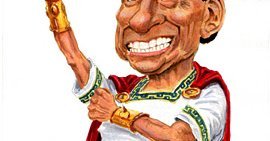Yet, it seems that public opinion has literally fallen asleep. Although some foreign newspapers have criticised Berlusconi openly before the election, and advised Italians not to cast a vote for him (and it was certainly not just The Economist doing so), there has been many fewer vivid attacks in Italy itself. Seemingly, the Cavaliere is being accepted as part of the system now.
Worryingly, the opinion is spreading that Berlusconi will be able to govern Italy, and there is even a growing consensus to push through reforms with all political parties. The tame opposition of Walter Veltroni, and the collaboration with the government (also dubbed Veltrusconi) is not considered problematic.
Worryingly, the opinion is spreading that Berlusconi will be able to govern Italy
Does that make the Berlusconi IV government a regime ? I think not, and the main reason is that Italy is a weak state. In contrast to the usual system of checks and balances of different institutions, Italy is held together through the checks and balances of different interest groups. Interests are not common, but spread over different parts of public life. Administration has its weight, as do regions, trade unions, larger and smaller political parties, organised crime, etc. This heterogeneity makes it very hard to implement any policy, as any party can block the reform. Despite the usual tough talk at the start of the reform, and the grandiose plans that are being announced, they quickly peter down to very marginal changes.
Paradocally, the weak state makes it less likely that any single person (or group) can abuse power. The dilution of power makes control very ineffective. A Berlusconi regime is therefore only hypothetical. If Italy is to solve its economic and social problems, and avoid regional or social disintegration, it will need to tackle the root the problem - the weak state. That translates into an effective system of institutional checks and balances.
Unfortunately, the question is whether we can entrust this reform to the only person that could actually abuse state power. Despite his great victory and large parliamentary majority, Berlusconi is not the person that can bring about this reform ; and this implies once more a delay of what Italy needs most.
The possibility of a deadlock in reform puts the participation of Italy in the EU under further strain. This raises the stakes of the other member states in the future of the country. The question is how this concern can be transmitted to the political life of Italy.
Can the modernisation of Italian public life be influenced directly or indirectly by what happens in other EU member states?

Follow the comments: |
|
